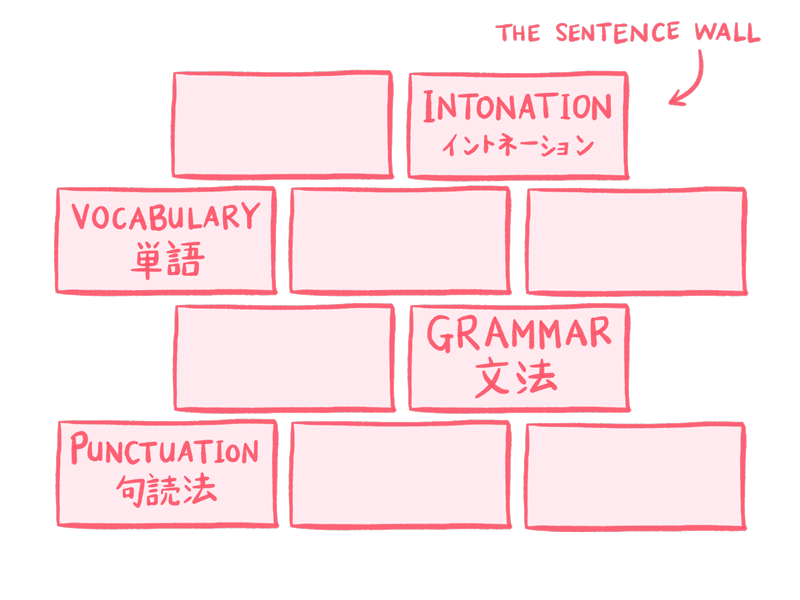イマージョン学習とは?
言語の学習方法には、大きく分けて「スキルビルディング」アプローチと「アクイジション(習得)」アプローチの2つがあります。
「スキルビルディング」アプローチは、レンガの壁を作るようなものだと捉えてみてください。個々の単語や文法を学び(レンガ)、それらを組み合わせて理解できる文章を作ります(壁)。
この方法は、初心者や長期休暇を利用して短期間で言語を習得したい場合には最適ですが、流暢に話せるようになりたい中級者や上級者にとってはあまり有効な方法ではありません。流暢に話すためには、複雑な文章を組み立てたり、完璧な文法を話そうと神経を使う時間はなく、正しい単語がすぐに頭に思い浮かぶ必要があります。ご自身の母語に当てはめて考えてみてください。おそらく母語の様々な文法規則やイントネーションについて知らないし、考えたこともないのではないでしょうか。その代わり、何年にも渡って日常会話から言語を習得し、何を考えているか自然と口にしていると思います。このことを言語習得と呼んでいます。
母語を習得したのと同じように、日本語も、できるだけ多くの日本語を聞き、読み、見ることによって習得することができます。これを「イマージョン・ラーニング」と呼びます。ネイティブの日本語をたくさん聴いたり読んだりすることで、不自然に聞こえる文章を「作る」必要がなくなり、無意識のうちにスピーキングやライティングのスキルも向上します。流暢に話せるようになるには長い時間がかかりますが、やり方によってはイマージョン・ラーニングは楽しくできるものなので、諦めずに頑張りましょう!次第にご自身の努力が目に見えてくるはずです。
イマージョン学習を通して英語を学ぶことについてもっと知りたい方は、次回のブログ記事で、イマージョン学習をうまくやるための5つのコツをお伝えしますのでお楽しみに!
What is Immersion learning?
There are two main ways of learning a language: the ‘skill-building’ approach and the ‘acquisition’ approach.
You can imagine the ‘skill-building’ approach as building a brick wall. Students learn individual words and grammar (the bricks) which they combine to create understandable sentences (the wall).
 This is a great method if you are a beginner or need to learn a language quickly, for example going on holiday, but is not so useful for intermediate or advanced students who want to become fluent. To speak fluently, you don’t have time to build complex sentences or worry about perfect grammar, you need the right words to come into your head quickly. Think about your native language; you probably don’t know or even consider the various grammar rules or intonation of your language. Instead, you picked up the language from daily life over many years, and now just say what you are thinking naturally. We call this language acquisition.
This is a great method if you are a beginner or need to learn a language quickly, for example going on holiday, but is not so useful for intermediate or advanced students who want to become fluent. To speak fluently, you don’t have time to build complex sentences or worry about perfect grammar, you need the right words to come into your head quickly. Think about your native language; you probably don’t know or even consider the various grammar rules or intonation of your language. Instead, you picked up the language from daily life over many years, and now just say what you are thinking naturally. We call this language acquisition.
You can acquire Japanese in exactly the same way as you acquired your native language; by listening, reading and watching as much Japanese as possible. This is called Immersion Learning. By listening to or reading lots of native Japanese, you will also unconsciously improve your speaking and writing skills, without needing to ‘build’ sentences that sound awkward or unnatural. Becoming fluent takes a long time, but with immersion learning it can also be fun, so don’t give up and you will start to see the results of your hard work!
Vocabulary:
Fluent – 流暢な (りゅうちょうな)
Language Acquisition – 言語習得 (げんごしゅうとく)
Intonation – イントネーション
Immersion Learning – イマージョン学習 (がくしゅう)
Unconsciously – 無意識に (むいしきに)
If you’d like to know more about how to use immersion learning to study English, look forward to our next blog post where we’ll give you five tips on how to do it well.
Reference: https://refold.la/

